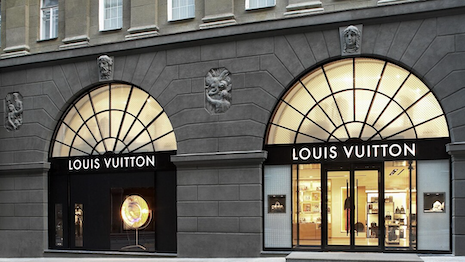 The Louis Vuitton boutique in Kyiv. Image credit: Louis Vuitton
The Louis Vuitton boutique in Kyiv. Image credit: Louis Vuitton
Now in its second month, Russia’s invasion of neighboring Ukraine continues to impact global markets.
According to a Bain & Company webinar, businesses must prepare themselves for the war’s long-term implications. Although the countries involved in the war are not major global markets, Russia and Ukraine – as well as Russia’s ally Belarus – are critical sources of food and energy.
“Commodities can be a source of instability and contagion that crosses over,” said Karen Harris, managing director of the macro trends group at Bain, New York.
“Many of us spent the last few weeks really focusing on protecting our people, getting people out of the market and so forth,” she said. “The next concern has been natural resource shortages – speculatively food, gas, oil – all of which reacted in price.”
Market stressors
Despite the humanitarian crisis on the ground, there have only been small ripples in the markets relating to natural resource shortages.
This is in part because European countries were still using Russian natural gas and existing food supply was grown and harvested prior to the invasion. However, supply shortfalls are still likely in the coming weeks and months.
Before the outbreak of war, some goods had already seen supply impacted or constrained due to COVID-19 disruptions.
“We entered a period where we were seeing supply shocks, problems with parts, difficulties in delivering equipment, backlogs,” Ms. Harris said. “And now we get added to that [with the war], and so what we’re seeing in inflation is a reflection of those supply shocks.”
Although Ms. Harris argues it is too soon to know if this period of inflation will be persistent or if it is a more natural reaction to swings in supply and demand, consumer confidence is shaken. Some consumers are already cutting back on nonessentials and have grown more susceptible to price sensitivity.
Businesses should also brace themselves, as fears over inflation may soon be followed by growth concerns.
“What we don’t know is if we see a financial market correction, if that rapidly turns to deflation,” Ms. Harris said. “We are already seeing signs of inflation fatigue across markets, meaning the rate of growth is slowing as consumers digest the fact that in many markets, wages are not keeping pace with inflation, and they are retrenching accordingly.”
Capital growth is also flattening as baby boomers retire, and cities have seen their growth slow as more consumers have embraced hybrid or work-from-home jobs.
There has already been concern about the slowing economy in China, one of luxury’s crucial markets.
The world’s second-largest economy saw GDP growth of 8 percent in 2021, and is expected to drop to 5.1 percent in 2022. This comes as the country struggles with an energy crisis, new COVID-19 outbreaks and a prolonged downturn in the property sector amid Evergrande’s recent default (see story).
Currently, Shanghai, the center of Chinese finance and trade, is under a strict COVID lockdown. This could have important implications on global luxury’s logistics and supply chains, as labor shortages and disruptions in shipments and cargo have been a significant effect of the strict COVID-19 rules (see story).
Luxury implications
While the economic fallout of the war continues, the luxury sector is likely to remain resilient.
In terms of price increases resulting from the current climate, affluents most likely will not be ruffled since they have the means to pay higher prices. The war, however, is slated to affect the aspirational luxury consumers in Europe and may dice revenue numbers for luxury brands previously projected at the beginning of 2022 (see story).
Nonetheless, brands should be aware that the global uncertainty goes beyond the war.
“This is not the only crisis we faced,” said Dunigan O’Keefe, partner and head of the global strategy practice at Bain, San Francisco. “Of course, we’ve had COVID but there have been many other shocks to the system that we as companies have had to absorb.
“And there’s no reason to believe that as we look forward as we draw this arrow forward to 2030, that we will be returning to some relatively sanguine period of moderation,” he said. “It is as likely we would expect that these crises continue to fall in going forward.
“And so while we think through the immediate response to this crisis, it’s also a reminder of a broader agenda that we think boards and leadership teams need to take more seriously.”